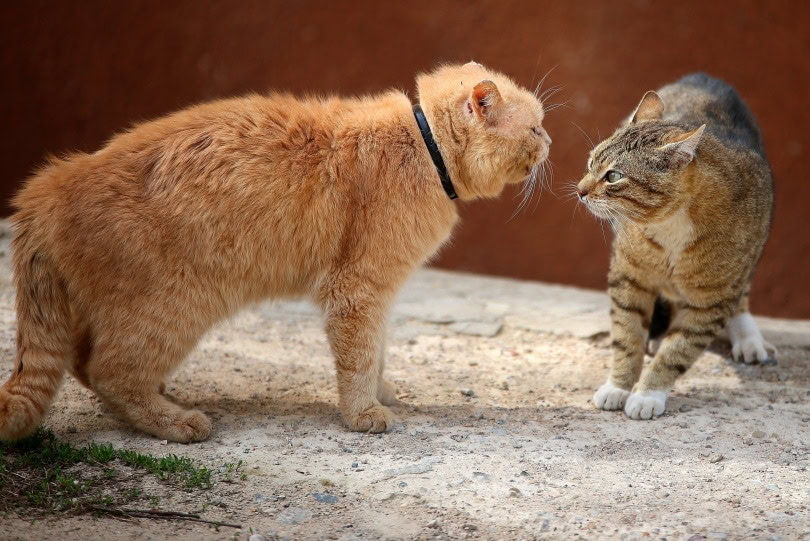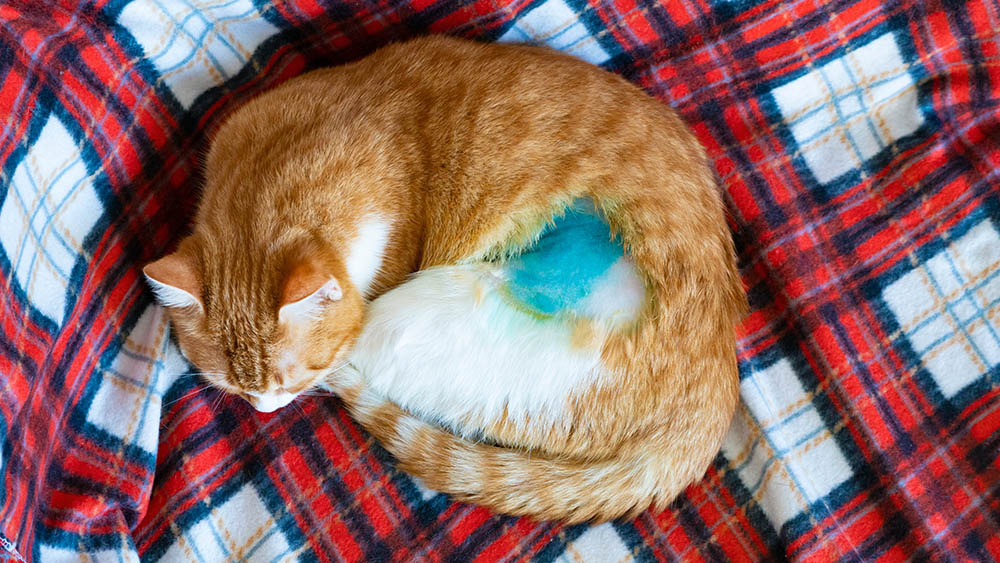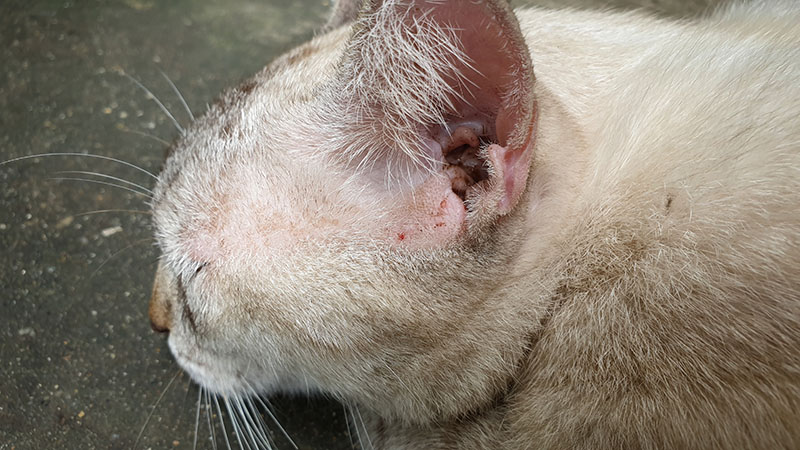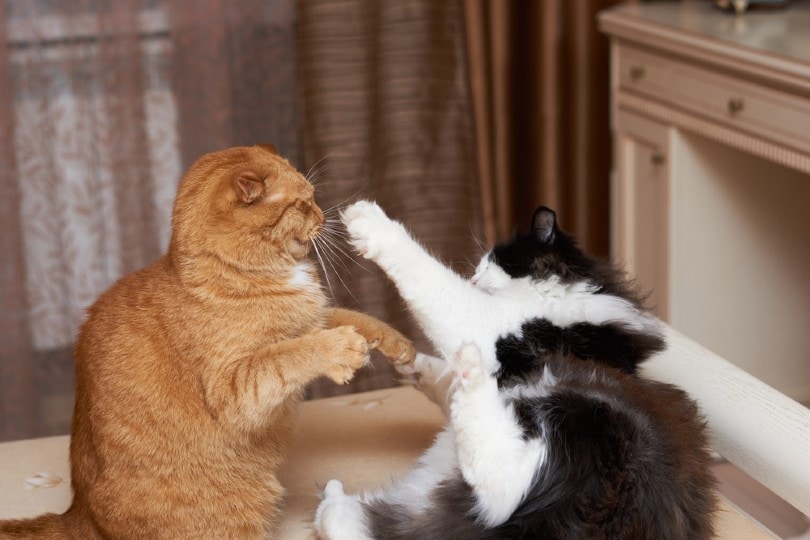VET APPROVED

The information is current and up-to-date in accordance with the latest veterinarian research.
Learn more »Click to Skip Ahead
If you love cats, it’s difficult to imagine life with only one in the home. While having multiple cats can lead to hours of pleasure for you and playtime for them, this scenario is also the perfect setup for the occasional catfight. Yes, catfights happen, and when they do, they can get pretty bad. But the big question on the minds of cat owners everywhere is, will cats fight to the death? Thankfully, the answer to that question is usually no; death isn’t the ultimate outcome.
While things can get rough during a scuffle between cats, and injuries can be had, cats usually stop short of death. Luckily, cats are intelligent enough to know that major injuries can affect their chance of survival, so they walk away before things get too bad. Let’s take a look at catfights, why they happen, and how you can lower the chances around your home.

The Main Causes of Cat Fights
Cats aren’t big on going blow for blow, although it does happen. Often, kitties around the house prefer to vocalize and posture at one another instead. However, that doesn’t mean they’ll never physically fight. When this does happen, there are usually reasons behind it. Let’s take a look!
Cats Are Territorial
Cats are naturally solitary creatures. They are also very territorial. Cats will identify or mark their territory using pheromones. When more than one cat is in the home, these territories are bound to overlap. When this happens, or unmarked territories come into play, disputes are going to happen. At times, these disputes can result in catfights.

Some Cats Are Aggressive
As with any animal, and in the human world, some cats are naturally more aggressive than others. Cats with this attitude may provoke more fights than the average house cat. You’ll also notice that male cats who haven’t been neutered are more prone to fighting and aggression, especially if female cats are in the vicinity.
Playing
Play fighting is a fun way for cats to get exercise and hone their skills. Normally, when this is taking place, cats don’t extend their claws and don’t intend on inflicting injury. However, there are times when play fighting can escalate to real fighting.

Motherly Instincts
Momma cats will be protective of their kittens. If you have a mother cat in your home, and other cats try to approach the kittens, she will instinctively hiss and growl to make the other cat stay away. If this doesn’t work, the mother cat may become aggressive which can result in a catfight.
What Is a Catfight?
Most people perceive a catfight as coming to physical blows. However, that isn’t always the case. When cats are hissing, slapping but not making contact, and even posturing aggressively toward one another, this can be seen as a catfight. If the less dominant cat doesn’t succumb and step away during this escalation, physical altercations begin. This is when the claws will come out, and blows will be shared.
While this can be frightening for you and others in the house, there is normally no need to panic. Cats are engineered to survive. This means they don’t want to suffer major injuries that may result in the inability to care for themselves. To avoid this, cats will usually walk away from one another before things get too out of control.

Should I Be Concerned If My Cats Fight?
While most fights resolve without issues, your cat may become injured during the altercation. Sadly, these kinds of altercations can lead to death in some cases, as a cat’s claws and mouth contain bacteria that can cause infections and serious problems. If your cat has been in a fight with another cat in your home or a cat in the neighborhood, cleaning and proper treatment are required.
Watch for these signs in your cat that they need attention after a fight:
- Puncture marks
- Open wounds
- Swelling
- Hot spots
- Pain
- Fever
- Loss of appetite
- Lethargy
Feline immunodeficiency virus (FIV) is termed the cat fight disease because the most common way of transmission is from bite wounds from infected cats. Its acute phase will typically occur only 1-3 months after the infection, and the virus will continue to spread toward the immune system of the infected cats, causing them to become immunocompromised and very susceptible to secondary bacterial, fungal, and viral infections.
How to Stop or Prevent Catfights Around the House
While it may not happen often, having cats that fight around the house can be dangerous. Luckily, there are things you can do to ensure your kitties aren’t injured and help squash the aggression between them.
Break It Up
Taking the approach of letting your cats work things out on their own isn’t the best thing to do. Instead, as a responsible pet owner, you need to intervene. While we don’t promote physically getting involved, making loud noises to catch your cat’s attention may be the answer. You can also try separating them using an object, such as a big lid or something, to physically intervene without exposing yourself; of course, be careful not to hurt them.

Make Sure Their Needs Are Met
Having multiple cats around the house means you need more resources for them to access. As we mentioned, cats are territorial and like having their own things. According to the number of kitties in the house, you should have multiple litter boxes. It’s also best to provide your kitties with separate feeding and watering stations.
Get Your Cats Spayed and Neutered
Spaying and neutering your cats can lower the chances of cat fights happening around the house. This is especially true if you have male cats at home. When your cat is at the appropriate age, reach out to your veterinarian to discuss this option.

Reward Your Kitties When They Behave Accordingly
Cats love food. When you see them being nice to one another or de-escalating situations on their own, offer them a reward. Treats and praise are ideal ways to do this and promote good behavior.
Enrichment Helps
Providing your cats with cat trees, perches, their own beds, and lots of toys can make things easier at home. If cats are well stimulated, they will fight less, and it’s better for their health.
Reach Out for Help
If you’ve tried everything you can think of and your cats are still fighting, you may need to speak to a cat behaviorist. They will give you advice, or even come by your home to work with your cats and try to ease the tensions.


Final Thoughts
While cats don’t normally fight to the death, injuries can be a result. Luckily, catfights, although they may look bad, aren’t typically that bad. If you have cats at home and want to avoid unnecessary confrontations, try implementing a few of the suggestions we’ve shared here. Your kitties may never be best friends, but perhaps they can co-exist happily in the same home.
- Related read: 8 Signs a Cat Is Dying (Vet Answer)
Featured Image Credit: Samarskiy, Shutterstock











